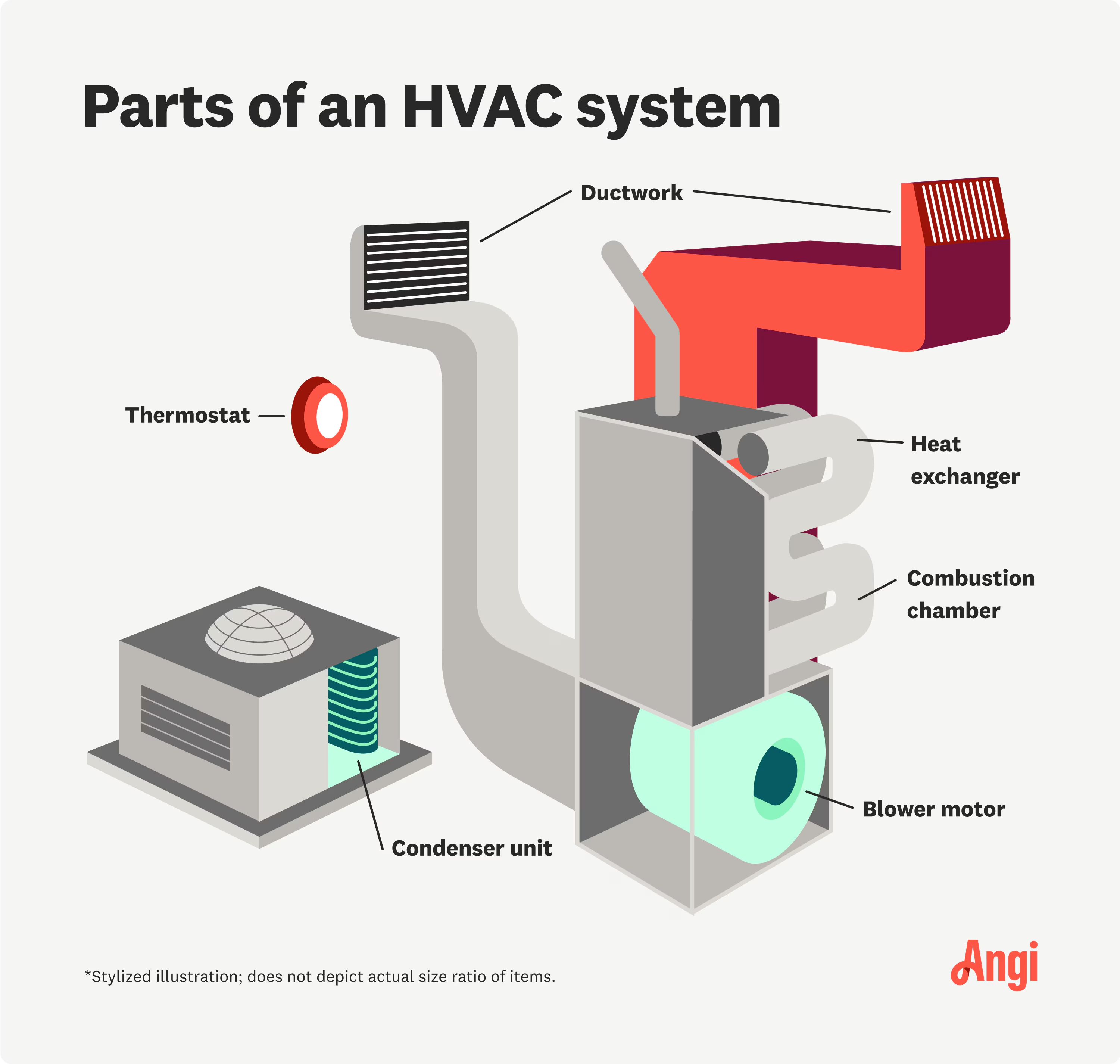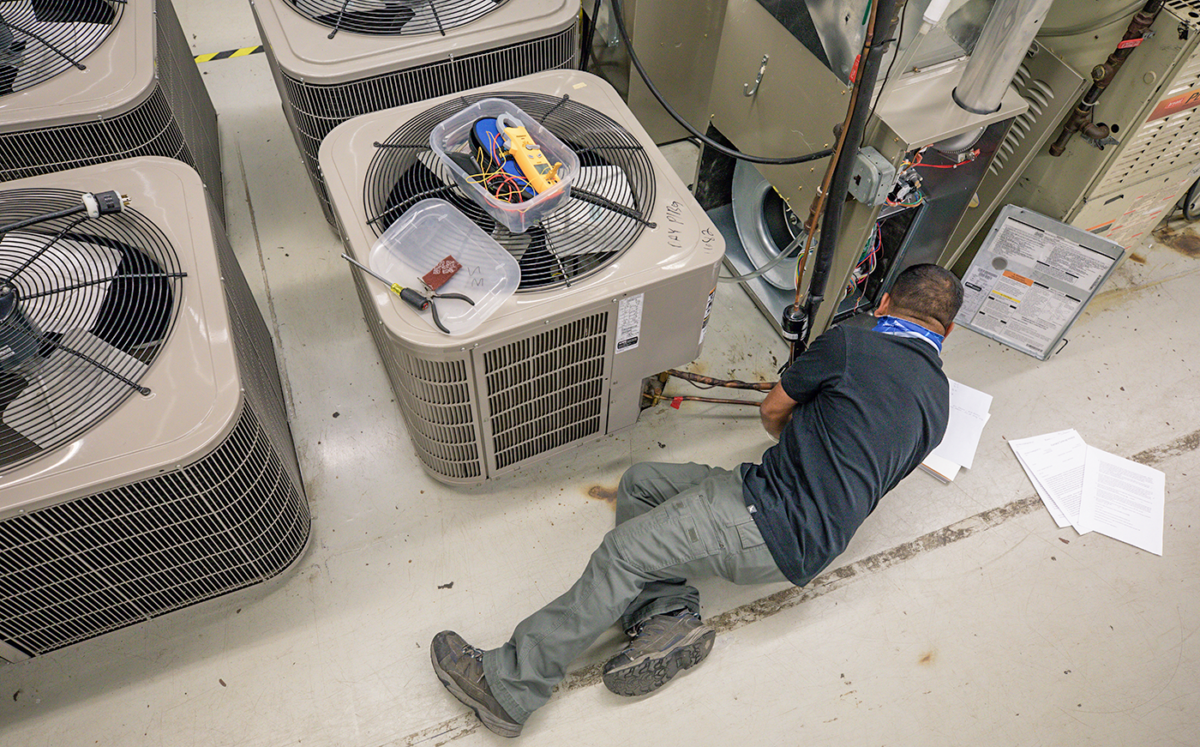HVAC Contractor for Reliable Heating and Cooling Solutions
HVAC Contractor for Reliable Heating and Cooling Solutions
Blog Article
A Comprehensive Consider Cooling And Heating Services and Their Effect on Power Effectiveness and Expense Cost Savings
With technological improvements like wise thermostats and high-efficiency components, the possibility for maximizing system efficiency is huge. As we check out the complex relationship in between Cooling and heating systems and functional expenses, including the change towards environmentally friendly choices, the question emerges: just how can these strategies be properly carried out to take full advantage of both eco-friendly and economic advantages?

Relevance of A/c Equipments
a/c systems are an essential element of modern-day structures, playing a critical duty in preserving healthy and balanced and comfortable indoor settings. These systems, including air, ventilation, and home heating conditioning, are important for managing temperature, moisture, and air high quality, consequently making sure the well-being of occupants. Reliable heating and cooling systems contribute significantly to developing an optimum interior climate, which is important for both industrial and property rooms.
In commercial structures, heating and cooling systems are integral to supplying a productive and risk-free atmosphere. By managing interior environment conditions, these systems assist protect against the growth of mold and mildew and the spread of air-borne pollutants, thus safeguarding the health of employees and consumers. Furthermore, in residential setups, cooling and heating systems enhance living problems by offering constant thermal comfort and boosting indoor air quality, which is vital for total wellness.
In addition, the design and maintenance of heating and cooling systems have a direct influence on power intake and operational expenses. Appropriately designed and maintained systems can significantly lower power use, bring about reduced utility expenses and a smaller sized carbon footprint. The efficiency of these systems therefore plays an important function in promoting sustainability and energy preservation within structures, highlighting their value in the modern architectural landscape.
Breakthroughs in HVAC Innovation
Technology in HVAC modern technology is reinventing the method structures manage interior environments, introducing a brand-new age of efficiency and control. Recent improvements have actually concentrated on optimizing energy usage while boosting customer convenience. One noteworthy development is the combination of smart thermostats, which make use of synthetic intelligence to find out occupancy patterns and adjust temperature levels as necessary, decreasing unneeded power use.
Variable Refrigerant Flow (VRF) systems represent another significant leap forward. These systems allow for precise temperature control in different zones of a building, enhancing comfort and reducing energy waste. VRF technology is particularly helpful for large industrial areas, supplying adaptability and scalability.
In addition, the advent of Internet of Things (IoT) gadgets has actually changed cooling and heating systems into interconnected networks with the ability of real-time data collection and evaluation. This connectivity enables predictive upkeep, ensuring systems operate at peak efficiency and minimizing unanticipated downtime.
Moreover, developments in products and style, such as making use of high-efficiency coils and compressors, have boosted general system performance - Heating Contractor. The fostering of eco-friendly refrigerants also underscores the market's commitment to sustainability
These technical technologies are crucial in reducing functional expenses and environmental effect, setting new standards for developing climate administration.
Heating And Cooling Upkeep and Effectiveness
Making certain ideal efficiency of HVAC systems prolongs past technological improvements; it also rests on reliable upkeep techniques. Normal upkeep is critical for maintaining performance, decreasing power usage, and prolonging the lifetime of a/c systems. The primary goal is to guarantee that all components operate at their peak possibility, consequently reducing power wastefulness and maintaining consistent indoor convenience degrees.
Routine upkeep jobs, such as cleansing or replacing air filters, examining refrigerant levels, and examining ductwork for leaks, are crucial for stopping unnecessary strain on the system. Blocked or filthy filters can obstruct airflow, creating the system to function harder and consume more energy. Likewise, inadequate cooling agent degrees can minimize cooling down performance, resulting in higher operational expenses.
In addition, routine inspections by qualified experts can recognize potential problems before they intensify right into costly fixings or system failures. These examinations commonly include inspecting electrical links, adjusting thermostats, and making certain the general stability of the HVAC system. By addressing small problems early, homeowners and organizations can avoid unanticipated malfunctions and improve power performance.
Cost-efficient Heating And Cooling Solutions
For those looking to get one of the most out of their heating, air, and air flow conditioning systems without breaking the bank, discovering cost-effective heating and cooling solutions can make a considerable distinction. One prompt procedure is to buy programmable thermostats, which permit individuals to establish particular temperature levels for different times of the day, enhancing energy use and lowering unnecessary consumption. By automating temperature level changes, property owners can accomplish significant savings on energy costs.
Regular maintenance is an additional critical element of affordable heating and cooling management. Ensuring that filters are cleaned up or replaced on a regular basis, ductwork is sealed, and units are serviced by professionals can prevent costly repairs and boost system long life. Preventative upkeep not my blog just keeps system performance yet additionally aids in preventing unforeseen malfunctions that can cause costly emergency repair work.
Additionally, retrofitting existing systems with energy-efficient components, such as variable rate electric motors or high-efficiency compressors, can be a sensible financial why not check here investment. These upgrades enhance functional performance, lower energy usage, and can typically be carried out at a fraction of the expense of a complete system substitute.
Ecological Influence Reduction
Lowering the ecological effect of HVAC systems is crucial in today's pursuit of lasting living. Cooling and heating systems are substantial factors to power usage, accounting for almost 40% of energy usage in business structures.
Technological advancements in heating and cooling design and procedure, consisting of the assimilation of wise thermostats and energy-efficient heatpump, are pivotal in decreasing carbon impacts. These developments enable enhanced energy use, decreasing waste and enhancing general system performance. Furthermore, taking on regular maintenance techniques guarantees heating and cooling systems operate at peak effectiveness, more stopping unneeded energy consumption.
Furthermore, using eco-friendly cooling agents is vital, as typical cooling agents, like CFCs and HCFCs, have been phased out as a result of their ozone-depleting residential or commercial properties. Modern alternatives, such as hydrofluoroolefins (HFOs), offer lowered ecological dangers, aligning with international environmental protocols. By welcoming these lasting methods, cooling and heating solutions can play a transformative function in minimizing environmental impacts, promoting energy efficiency, and fostering a more sustainable future.
Final Thought

In addition, the design and upkeep of HVAC systems have a direct effect on power intake and operational prices. Routine maintenance is critical for sustaining effectiveness, minimizing power usage, and expanding the life span of Cooling and heating systems. A/c systems are substantial contributors to power usage, accounting for virtually 40% of energy use in industrial structures. In addition, adopting routine upkeep practices guarantees A/c systems run at peak performance, further curtailing unnecessary power intake.
The transition to ecologically friendly A/c systems better lowers functional expenses and trane hvac units for sale promotes sustainability. (Heating Contractor)
Report this page